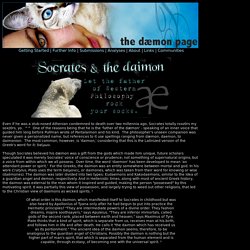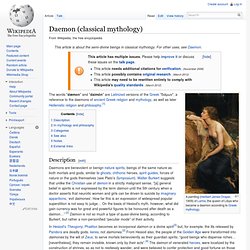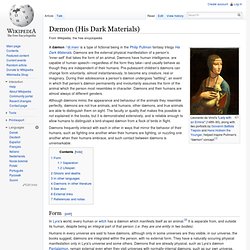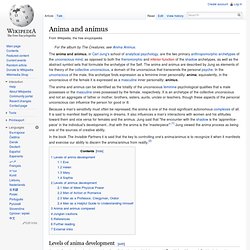

Bibliothek. Very Short Introductions. Socrates and the Daimon. Even if he was a stub-nosed Athenian condemned to death over two millennia ago, Socrates totally roxz0rs my soxz0rs, yo. ^^ One of the reasons being that he is the 'father of the dæmon' - speaking of an inner voice that guided him long before Pullman wrote of Pantalaimon and his kind.

The philosopher's unseen companion was never given a personalized name, but references to it use spellings ranging from dæmon, daemon, to daimonion. The most common, however, is 'daimon,' considering that this is the Latinized version of the Greek's word for it: δαίμων. Though Socrates believed his dæmon was a gift from the gods which made him unique, future scholars speculated it was merely Socrates' voice of conscience or prudence; not something of supernatural origins, but a voice from within which we all possess.
Over time, the word 'daemon' has been developed to mean 'an attendant power or spirit.' Daemon (classical mythology) The words "dæmon" and "daimôn" are Latinized versions of the Greek "δαίμων", a reference to the daemons of ancient Greek religion and mythology, as well as later Hellenistic religion and philosophy.[1] Characterizations of the daemon as a dangerous, if not evil, lesser spirit were developed by Plato and his pupil Xenocrates,[2][dubious ] and later absorbed in Christian patristic writings along with Neo-Platonic elements.

In the Old Testament, evil spirits appear in the book of Judges and in Kings. Satanists have used the word demon to define a knowledge that has been banned by the Church. Carnelian gem imprint representing Socrates, Rome, 1st century BC - 1st century AD. Burkert suggests that, for Plato, theology rests on two Forms: the Good and the Simple; which “Xenocrates unequivocally called the unity god” in sharp contrast to the poet's gods of epic and tragedy.[2] Although much like the gods, these figures were not always depicted without considerable moral ambiguity: Dæmon (His Dark Materials) A dæmon /ˈdiːmən/ is a type of fictional being in the Philip Pullman fantasy trilogy His Dark Materials.

Dæmons are the external physical manifestation of a person's 'inner-self' that takes the form of an animal. Dæmons have human intelligence, are capable of human speech—regardless of the form they take—and usually behave as though they are independent of their humans. Pre-pubescent children's dæmons can change form voluntarily, almost instantaneously, to become any creature, real or imaginary. During their adolescence a person's dæmon undergoes "settling", an event in which that person's dæmon permanently and involuntarily assumes the form of the animal which the person most resembles in character. Dæmons and their humans are almost always of different genders. Although dæmons mimic the appearance and behaviour of the animals they resemble perfectly, dæmons are not true animals, and humans, other dæmons, and true animals are able to distinguish them on sight.
Similar concepts General. Anima and animus. The anima and animus can be identified as the totality of the unconscious feminine psychological qualities that a male possesses or the masculine ones possessed by the female, respectively.

It is an archetype of the collective unconscious and not an aggregate of father or mother, brothers, sisters, aunts, uncles or teachers, though these aspects of the personal unconscious can influence the person for good or ill. In the book The Invisible Partners it is said that the key to controlling one's anima/animus is to recognize it when it manifests and exercise our ability to discern the anima/animus from reality.[2] Levels of anima development[edit] Eve[edit] The first is Eve, named after the Genesis account of Adam and Eve. Helen[edit] The second is Helen, an allusion to Helen of Troy in Greek mythology. Mary[edit] Edward St Aubyn.
Edward St Aubyn (born 14 January 1960 in Cornwall) is a British author and journalist. He is the author of seven novels, of which Mother’s Milk was shortlisted for the 2006 Man Booker Prize, won the 2007 Prix Femina Etranger, and won the 2007 South Bank Show award on literature. His first novel, Never Mind (1992) won the Betty Trask award. On the Edge (1998) was shortlisted for the Guardian Fiction Prize.
Education: He attended Westminster School and Keble College, Oxford University. Edward St Aubyn has two children, Lucian and Eleanor, and lives in London. Patrick Melrose Series[edit]